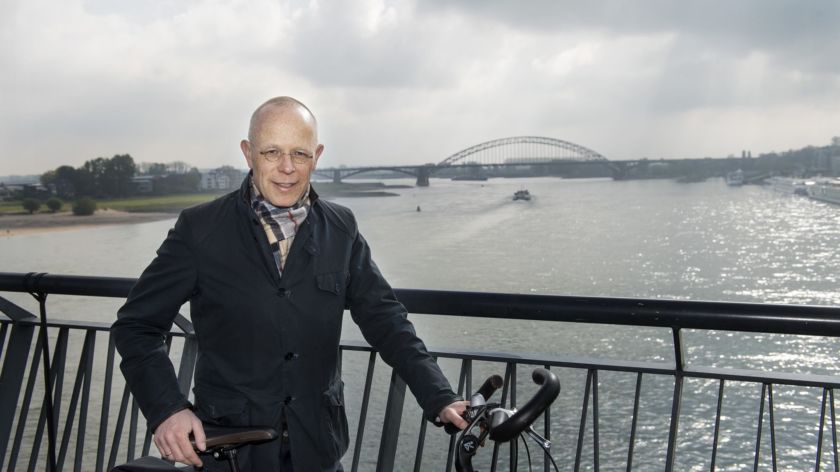‘I don’t have a polarising personality’
-
 Photography: Bert Beelen
Photography: Bert Beelen
He is neither a woman, nor a Catholic, nor old. What Daniël Wigboldus is: the new President of the Board of Radboud University.
The band currently topping Daniël Wigboldus’ (47) list of favourites is Snarky Puppy. A group of primarily American musicians who all individually belong to the world top, but who when they play together do so to benefit the collective. ‘The fact that this is what I find so appealing about them probably says a lot about me’, he confesses. Social psychologist Wigboldus is not only a big Jazz and Blues fan, he is also someone who believes in the power of teams. Not everyone has to be a solo guitarist, bass players are equally important. This is one of the values he wishes to propagate during his coming years as the President of the Board of Radboud University (since 1 May).
Did you apply for the job or were you asked?
‘I was approached, a while ago now, with the question whether I might be interested in this position. I felt honoured and immediately started to concretely think about it. Was this what I wanted to do? And yes, I think that this is a really great job, and that it offers me the challenge I need to grow further.’
Enthusiastic
What do you find so great about this position?
‘A university is a beautiful organisation with an important role to play in society. I have always found it amazing to see secondary school pupils enter the system and within a few years fly out as critical scholars. As a member of the Executive Board, I can contribute to setting the future course of Radboud University, and this is something I am very enthusiastic about.’
What is the first thing you plan to do?
‘At this moment, I believe that our University is right on track. I don’t plan to change course. We are well on our way to becoming an international university. At the same time, we should not lose sight of our regional and national function. We have to carefully consider how we can further shape our interaction with other research universities and universities of applied sciences, companies and governmental institutions. Radboud University is a special university in this sense, because it has traditionally attracted groups that may not believe that “they belong at university.” This emancipation drive is our guiding star. I would like to communicate my belief that everyone is welcome here, and that we recognise and value differences between people.’
‘Values such as these form the roots of our University’
You are the first non-Catholic President in the history of Radboud University. Was this an issue during the procedure?’
I was asked whether I feel comfortable with the University’s philosophy and identity. I was raised in an Ecumenical Protestant environment. The Christian philosophy, in particular /brotherly love – a value shared by many religions – is something I recognise myself in. Yes, knowledge and skills are crucial, but what we also want to impart to our Nijmegen students is that they live and work together with other people, and how important it is for them to be involved and committed. That there is a social and a natural world surrounding them and of which they are part. Values such as these form the roots of our University and they are the foundation on which we can build further. This is why I have always felt so much at home here.’
You are a researcher, as was your predecessor Gerard Meijer. He missed research, and decided to leave after four years.
‘My career has taken a different turn. Along the way I have taken on an increasing number of administrative tasks. In 2005, I was appointed Professor at Radboud University and a few years later I took on a part-time position as Director of Education. For the past four years or so, I have worked as a Dean, a 100% administrative position. I have grown towards this position gradually, by following my heart. The University very consciously sought someone with an academic background, because such a person would know from first-hand experience what teaching is like, and how frustrating it can be to apply for and not get research funding.’
But what about the researcher in you: doesn’t he long to do research?’
I decided to study psychology because I am fascinated by people. This is also what I like about my work as an administrator. I have no choice but to bring my investigative mind to bear on this position too. In the same way that I critically analyse an academic article, I will also analyse an administrative document. And I will, of course, keep abreast of developments and publications in my field.’

At 47 you are the youngest President of the Board of all the Dutch universities. Do you see this as an advantage or a disadvantage?
‘My colleague in Tilburg may be slightly older – we were born in the same year – but he has occupied his position for some time. So it’s not completely true to call me the youngest. Also: when I was appointed Professor, journalists often referred to me as “the young professor”. I always found this a bit strange. You either are a professor or not. Age is not an issue.’
The job ad spoke of a ‘she’ rather than a ‘he’. It seems that the ideal candidate was a woman. What are your feminine qualities?
Laughing: ‘Well, in any case not my hairdo.” Seriously: “You see, I now fall back on my own field of study: prejudices. We often tend to label certain characteristics as typically feminine or masculine, while the differences within genders are much greater than between men as a group and women as a group. I am mostly just Daniël. What I can say about myself is that I am by nature a connector. I always try to keep in mind where we want to go, and I try to make sure we all go there together. Once again, with appreciation and recognition of the differences between people. I don’t have a polarising personality.’
The Hague
In his farewell interview Meijer said that his successor should preferably have good contacts in The Hague. What do you have to say about this?
‘I am not an ex-politician, and this makes The Hague one of my focus points. As Chairman of the Disciplinary Consultative Body for Social Sciences, over the past years I have grown to know many people all over the country. I also grew up in The Hague, so I assume I will be able to find my way there.’
Universities in the Randstad region don’t have to work hard to make themselves visible, as opposed to universities in the provinces. How will you make sure Nijmegen stands out?
‘I’m not the type to shout from the rooftops how good we are, it’s just not who I am. We just have to make ourselves visible. In the media, in The Hague. Something we already do – but that we could be even more active in – is inviting people to come here. Throwing our doors wide open. We have to show how good we are, so that others can see for themselves that beautiful, exceptional things are happening here in Nijmegen.’
Your name appears on the address list of many journalists: you have often spoken in an accessible manner in the media about your research on prejudices, and you even gave a lecture at the Black Cross. Can journalists still call you?
‘There’s nothing wrong with a phone call. But I now represent the entire University, rather than my own field of study. However, if journalists want an enthusiastic story about Radboud University, they are welcome to call me up in the middle of the night.’
‘I’ll miss my band very much’
You play keyboard in a band. Will you still be able to combine this with your work?
‘We practise every other week in Zoetermeer, and some of the band members want to perform more, so it will be difficult to combine. I’d like to look for something new in Nijmegen. I’ll miss my band very much. There are ten of us, and we play Blues. What I really enjoy about making music, alone or together, is that everything else fades into the background. At a certain point you look at the clock and you think “What?!? So late already?” You lose track of time. It’s important to have something besides your work. Cycling has the same effect on me. For twelve years now I’ve cycled across the Snelbinder bridge from Nijmegen North to the University. I hope to continue to do so as often as possible.’
[kader-xl]
How exceptional is the new President of the Board?
A man among men. The job ad asked for a “she”, but the new President of the Board is a man. As are eight of his twelve colleagues. The Universities of Utrecht, Wageningen, Rotterdam and Amsterdam (UvA) are all currently headed by women.
The only psychologist. Among the thirteen Dutch university presidents, Wigboldus is the only psychologist. Three also have a background in social sciences. The rest consists of three scientists and two medical experts. With four members, the legal branch is best represented at the administrators’ table.
The youngest. At 47, Wigboldus may be a “young” candidate, but one of his early predecessors – Willy van Lieshout – was even younger when he was appointed President of the University Board of Nijmegen in 1974. He was only 45. Wigboldus is currently the youngest among his colleagues elsewhere in the country. Koen Becking of Tilburg University is one year older, while all other presidents are in their fifties and sixties.
A Protestant. With the appointment of Wigboldus, our Catholic University is headed by a Protestant for the first time.
An internal recruit. Only the very first University President in Nijmegen was an internal recruit: in 1972 Dries van Melsen exchanged his chair for the presidential hammer. He was followed by a long list of external appointees: Willy van Lieshout (1974) came from DSM, Tom Stoelinga (1992) from a university of applied sciences, Roelof de Wijkerslooth (2000) from the Ministry of Education, and in 2012 Gerard Meijer transferred from the Max Planck Institute in Berlin. Elsewhere in the Netherlands, “internal” appointments are not particularly exceptional: Leiden, Maastrict and the University of Amsterdam are all headed by one of their own professors.
[/kader-xl]



